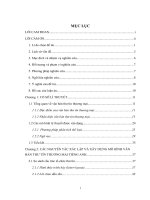thư tín thương mại ftu shiping
Bạn đang xem bản rút gọn của tài liệu. Xem và tải ngay bản đầy đủ của tài liệu tại đây (5.18 MB, 20 trang )
Transportation and
Shipping
CuuDuongThanCong.com
/>
Road, rail and air transportation
CuuDuongThanCong.com
/>
Road transport
-
cheaper and more direct than rail
Increased capacity for lorry to carry goods
(containers), faster service (motoways),
accessibility abroad with ferries offering
rolling-on and rolling-off facilities
CuuDuongThanCong.com
/>
Rail transport
Faster than road ( necessary when transporting
perishable goods)
Can haul bulk commodities (oil, grain, coal) in
greater volume than road transporters
Link between road and rail through companies
such as Freightliners – transhipment
Tends to be comparatively more expensive
than road haulage
CuuDuongThanCong.com
/>
Air transport
Necessary for goods lose value overtime and
deteriorate
Use for speed, particularly over long distances
Insurance tends to be cheaper as consignments spend
less time in transit
With bulk consignments, air is much more expensive
The main document – Air Waybill, which consists of
12 copies distributed to the airline, exporter, importer,
and custom
AWB is only a receipt and cannot be transferred to
another person
CuuDuongThanCong.com
/>
Documentation
Consignment notes are used in road and rail
transportation
Consignment notes and AWB are not
documents of title, and not negotiable
Consignment notes and waybills are obtained
by the consignor filling out an instruction for
despatch form and paying the freight charges.
The charges are calculated in size, weight or
value and risk
CuuDuongThanCong.com
/>
Correspondence in transport
Between the seller and freight firm
Between the seller and forwarding agents
The customer are kept informed by advice note –
details of packing and when goods will arrive
CuuDuongThanCong.com
/>
Shipping
CuuDuongThanCong.com
/>
Types of vessels
Passenger liner
Passenger cargo vessels
Tramps
Tankers
Container vessels
Roll-on roll-off ferries
Barge and lighter
CuuDuongThanCong.com
/>
Note
SS – Steam Ship
MV – Motor Vessel
MS – Motor Ship
CuuDuongThanCong.com
/>
Shipping organizations
The Shipping Conference
The Baltic exchange
CuuDuongThanCong.com
/>
Shipping documentation
A freight account is an invoice sent by the shipping
company to the exporter stating their charges.
A shipping note advises the Superintendent that the
goods are to be shipped.
A dock receipt will be returned to the consignor
confirming that the goods are stored and awaiting
shipment.
A mate’s receipt may be sent acknowledging that the
goods have been loaded.
ETA
CuuDuongThanCong.com
/>
Bill of ladding
The most important document in shipping as it is a document
of title
“full set” – 3 originals
“to order” are written – a negotiable document
“endorse in blank” or “blank endorsement” – no restriction on
ownership
A shipped b/l or shipped on board – goods have been loaded
on to the ship
“clean” – goods were taken on board in good condition
“dirty/claused” – found something wrong with the
consignment
“freight prepaid”
“freight collected”
CuuDuongThanCong.com
/>
Shipping liabilities
The Hague Rules govern liability for loss and damage to cargo
carried by sea under a b/l and state that the carrier will not
responsible under the following conditions:
Acts of war, riots. Civil disturbance
Force majoeure
Negligence
Inherence vice
The Hamburg Rules have extended the shipping companies‟
liability for damage or delay to „ goods in their charge‟ unless
they can proof thaey took all measure to avoid the problem
To be safe, co. insures the consignment under all risk cover
and war
CuuDuongThanCong.com
/>
Forwarding agents
Forwarding agents are used by exporters to arrange both
import and export shipments.
The service includes: collecting consignment, arranging
shipment, packing and handling all doc., incl. making out b/l,
obtaining insurance, sending commercial invoice, paying the
shipping co. for their client, informing the importer‟s
forwarding agents that the shipment is on its way by sending
advice note, send the goods on to him or arrange for them to
be stored until collected.
Many forwarding agents act as clearing agents – ensure the
goods are cleared through the custom and are sent to the
importer
CuuDuongThanCong.com
/>
Container services
Containers are large steel boxes, 20 to 40 feet
in length, can hold most cargoes including
liquids and are transported by lorries or trains
to port where they are loaded on to container
vessels.
Containers are safe because of their sealing
Containers are versatile, loading top, front or
side and can cut a ship laytime (waiting time)
down by 60-70%
CuuDuongThanCong.com
/>
Advantages of container services
The containers can be loaded and locked at the
factory premises or at nearby container bases
making pilferage impossible.
There is no risk of goods getting lost or
mislaid in transit.
Handling is greatly reduced, with lower cost
and less risk of damage.
Reducing loading and unloading time
Temperature-controlled container are available
CuuDuongThanCong.com
/>
Documentation for exporting goods
by container
Bill of lading: clean shipped on board bill
Combined transport bill of lading
Non-negotiable waybills
CuuDuongThanCong.com
/>
Documentation for importing goods
by container
Freight invoice
Arrival notification form
Custom clearance form
Certificate of origin
Commercial invoice
Import licence
Health certificate
Bill of lading or waybill
Out of charge note
CuuDuongThanCong.com
/>
Chartering ships
Voyage charter charges are calculated on the
tonnage value of cargo.
Time charter charges are calculated on the
tonnage of the ship plus running costs of the
vessel, excluding wages.
Mixed charter are combined both time and
voyage charters. The contract singed by both
parties is known as charter party
CuuDuongThanCong.com
/>









